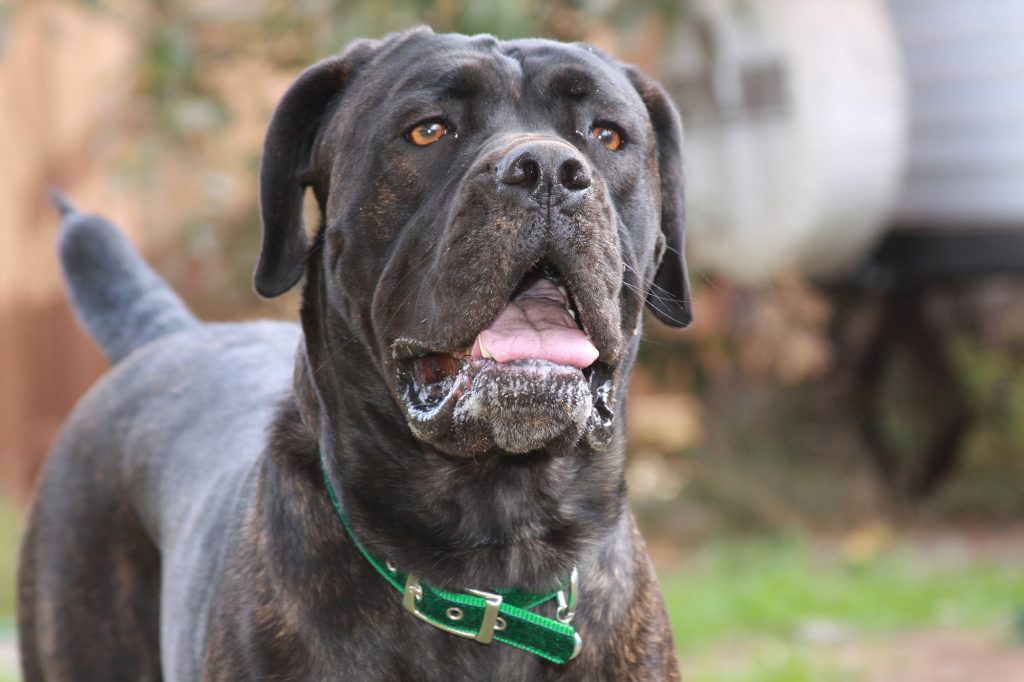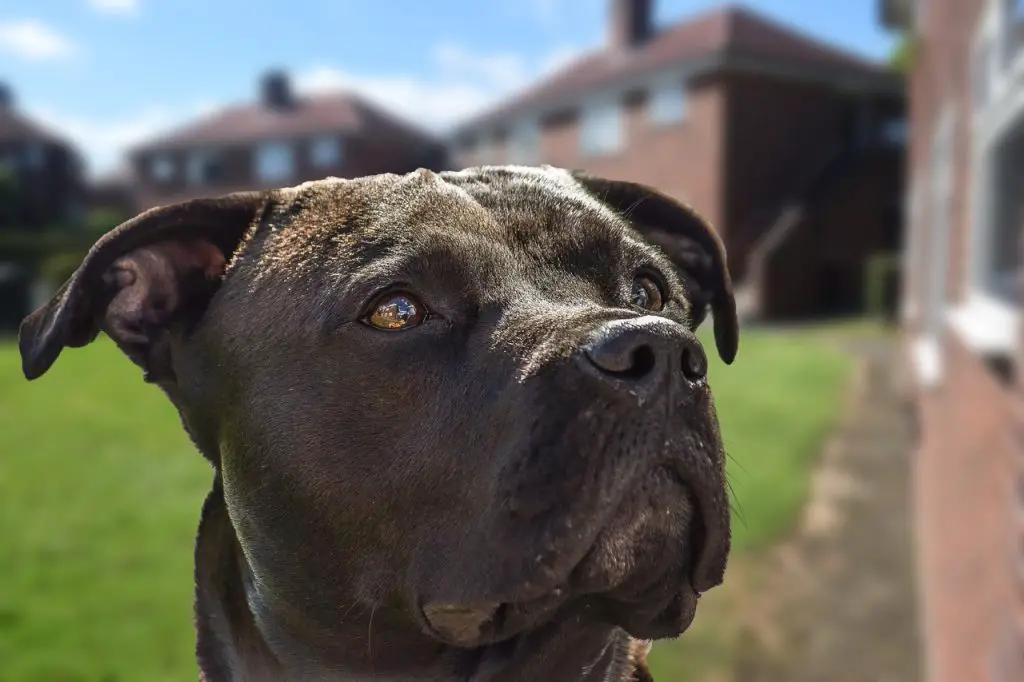Do you have a Cane Corso? If so, you may be wondering if they are heavy droolers. They are notorious for their drooling, but I wanted to find out if all Cane Corso’s drool or just some.
In this blog post, we will discuss the truth about Cane Corso‘s and whether or not they are heavy droolers. We will also provide tips on how to deal with excessive drooling if your dog happens to be one of the heavy droolers!
Key Takeaway
- Cane Corsos can vary in their drooling habits, with those having floppy, long jowls tending to drool more than those with tighter, shorter jowls, and factors like stress, excitement, and drinking can also influence their drooling.
- To reduce drooling in a Cane Corso, ensure they are well-hydrated, maintain their dental health, manage their diet and excitement levels, use drool-control products like bibs, and schedule regular vet check-ups to rule out any underlying health issues.
Are Cane Corso’s Heavy Droolers?

Yes. Cane Corso’s are heavy droolers. Typically, male Cane Corso’s tend to be heavier droolers than females. Cane Corsos have very loose skin around their mouths, which allows saliva to build up more easily than it does in other breeds.
Additionally, Cane Corsos tend to produce more saliva than other dogs due to their unique anatomy; their long tongues can push saliva out of their mouths more easily than shorter-tongued breeds.
One of the most famous traits of the Cane Corso breed is in fact drooling. But, you have to consider the fact that not all Cane Corso dogs drool a lot.
If your Cane Corso has a lot of loose skin around his face (like many Mastiff breeds do), he is likely to produce more saliva and thus, more drool. But whether your Cane Corso is a heavy drooler or not will largely depend on his individual temperament and genetic makeup.
The average dog produces about 30 ml of saliva per day, but that number can vary quite a bit depending on the individual dog.
Estimates for how much saliva a Cane Corso generates in a day range from 50 ml to over 100 ml. That means that a single Cane Corso could produce enough saliva in a day to fill a small cup!
While most dogs produce more saliva during the summer months due to the increased heat and humidity, the Cane Corso does not seem to be affected by the weather in the same way. Their saliva production remains consistent year-round.
But even though Cane Corsos drool more than most dogs, it’s nothing to be worried about. In fact, many people find it endearing! So if you’re looking for a loyal and Drooly friend, the Cane Corso is perfect for you.
Do Cane Corso’s Drool All The Time?

No, Cane Corso’s don’t drool all the time, but they certainly can. Cane Corsos are a bit more notorious for their drooling than other breeds, but that doesn’t mean they’re dripping all the time. If you’re considering adding a Cane Corso to your family, you’ll just need to be prepared to have a drool rag on hand when necessary.
Cane Corsos tend to drool more when they’re excited or working hard. If you see your dog starting to slobber, it’s best to have a towel handy to wipe away the excess saliva. Otherwise, you might find yourself with a wet spot on your furniture or clothes.
While most dog owners are used to having some drool around the house, it’s important to keep an eye on your Cane Corso’s drooling habits. If you notice that your dog is drooling more than usual, it could be a sign of a health problem.
Excessive drooling can sometimes be a symptom of something serious, like kidney disease or liver problems. If you’re concerned about your dog’s drooling, make sure to talk to your veterinarian says PawCited.
Why Do Cane Corso’s Drool So Much?
Cane Corsos tend to drool more due to their genetic predisposition linked with the structure of their mouth, particularly those with longer, floppier jowls, and this can be exacerbated by factors such as anticipation of food, stress, and heat.
One way to help reduce the amount of drooling is to keep your Cane Corso’s mouth clean and free of debris. This will help to reduce the amount of saliva produced in their mouths and therefore should help to reduce the amount of drooling.
You can also try feeding your Cane Corso smaller meals more often throughout the day instead of one large meal. This will help to prevent them from gulping down air which can also contribute to increased drooling.
If you’re still having trouble with excessive drooling, it’s best to consult with your veterinarian as there may be an underlying health issue that needs to be addressed.
How To Stop Cane Corso Drooling
To reduce drooling in your Cane Corso, you need to ensure they’re well-hydrated, maintain their oral health, use specialized drool-control products, and manage their diet and excitement levels.
Keep Your Dog Hydrated
Ensuring that your Cane Corso stays hydrated can help control drooling. Provide fresh water at all times and encourage frequent drinking. Dehydration can make saliva thicker and more noticeable.
Maintain Oral Health
Regular dental check-ups and teeth cleaning are essential to prevent excessive drooling caused by oral health issues. Brush your dog’s teeth regularly and provide dental chew toys to promote good oral health.
Use Drool-control Products
There are various drool-control products available in the market, like dog bibs or bandanas. They can help catch excess drool and keep your home clean while making your pet comfortable.
Manage Diet and Excitement Levels
Diet can play a role in controlling drooling. Avoid feeding your dog foods that trigger excessive salivation. Also, try to keep their excitement levels under control as excitement can lead to increased drooling.
Regular Vet Check-ups
Regular vet check-ups can help identify any underlying health issues that might be causing excessive drooling. If your Cane Corso is drooling more than usual, it’s a good idea to consult with a vet.
How Dirty is Dog Saliva?
A lot of people believe that dog saliva is very dirty and can cause a lot of infections. However, this is not necessarily true. Dog saliva actually contains a lot of enzymes that can help kill bacteria. This means that while dog saliva may not be as clean as human saliva, it is still relatively clean. But, it is a completely different story when it comes to babies.
Dog saliva is not safe for babies. If a baby ingests dog saliva, it can develop an infection called Pasteurella multocida. This infection can cause fever, diarrhea, and vomiting in babies. In severe cases, it can lead to pneumonia or meningitis. If you think your baby has ingested dog saliva, please contact your doctor immediately.
Pasteurella multocida is a bacteria that is found in the mouths of dogs. When this bacteria gets into a person’s bloodstream, it can cause an infection. Symptoms of this infection include fever, diarrhea, and vomiting. In severe cases, the infection can lead to pneumonia or meningitis.
FAQs
Q: What is the average size of a Cane Corso?
A: The average size of a Cane Corso is around 23 to 27 inches at the shoulder for males and 23 to 25 inches for females. They typically weigh between 90 to 120 pounds.
Q: Do Cane Corsos require a lot of exercise?
A: Yes, Cane Corsos are a large and active breed that requires regular exercise to keep them happy and healthy. They have a moderate to high energy level and should be provided with daily walks, playtime, and mental stimulation.
Q: Are Cane Corsos good with children?
A: When properly socialized and trained, Cane Corsos can be good with children. However, due to their large size and protective nature, they may not be suitable for households with very young children or children who are not familiar with dogs.
Q: Do Cane Corsos get along with other pets?
A: Cane Corsos can be selective with other pets, especially dogs of the same sex. Proper socialization and introductions from a young age are crucial to help them get along with other pets. It’s always important to supervise any interactions between Cane Corsos and other animals.
Q: Are Cane Corsos easy to train?
A: Cane Corsos are known for their intelligence and willingness to please their owners. With consistent training methods that involve positive reinforcement and firm guidance, they can be trained successfully. However, early socialization and obedience training are important to ensure they grow into well-behaved adults.
Q: Do Cane Corsos have any health issues?
A: Like all breeds, Cane Corsos are prone to certain health issues. Some common health problems in Cane Corsos include hip dysplasia, elbow dysplasia, bloat, cherry eye, and certain heart conditions. Regular veterinary check-ups and a healthy diet can help prevent or detect these issues early on.
Q: How should I groom a Cane Corso’s coat?
A: Cane Corsos have a short and dense coat that requires minimal grooming. Regular brushing with a soft-bristle brush or rubber grooming mitt can help remove loose hair and keep their coat shiny. They only need occasional baths when they get dirty. Nails should be trimmed regularly, and dental care is important for their overall health.
Q: Are Cane Corsos good guard dogs?
A: Yes, Cane Corsos are known for their natural guarding instincts and protective nature. They are generally loyal, alert, and can be an excellent deterrent to intruders. However, proper training and socialization are essential in order to have a well-behaved and reliable guard dog.
Q: What is the average lifespan of a Cane Corso?
A: The average lifespan of a Cane Corso is around 9 to 12 years. However, with proper care, nutrition, exercise, and regular veterinary check-ups, some Cane Corsos have been known to live even longer.
Conclusion and final thoughts
In conclusion, the Cane Corso is a breed of dog that can be considered to be a heavy drooler.
Although this trait may not be desirable in all situations, the breed’s popularity indicates that many people are willing to overlook it in order to enjoy the benefits of owning a loyal and intelligent pet.




